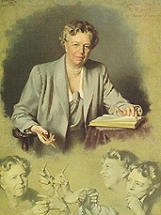 “Pit race against race, religion against religion, prejudice against prejudice. Divide and conquer! We must not let that happen here.” ~Eleanor Roosevelt
“Pit race against race, religion against religion, prejudice against prejudice. Divide and conquer! We must not let that happen here.” ~Eleanor Roosevelt
Eleanor Roosevelt, our dynamic first lady in the first half of the 20th Century, understood that the concept of “divide and conquer” assumed several things:
1. Not everyone is equal;
2. There had to be winners and losers;
3. Given a particular idea, situation, or belief, compromise was impossible.
Mrs. Roosevelt believed differently. In her work to support her husband’s New Deal, in the formation of the United Nations, the development of child labor laws, and many other important cultural and governmental developments, she saw that as a nation and as a world, we had the power to work together for the greatest good. Everyone is equal. Everyone could be winners. Compromise was always possible with intelligent, compassionate people involved in the development of a resolution to even the most difficult challenges.
What would she say if she could see the politics of today? Would she say that we have found our way to building a national community? Would she marvel at our ability to listen to one another and work together to build a strong, sensitive, and wise nation? Not likely. I suspect she would be shocked at the level of partisanship, extreme religiosity, and utter lack of civility among America’s children. She might be saddened that we have lost our way in our attempt to create one great nation rather than the fractured microcultures that exist in our country in the 21st Century.
I never knew Mrs. Roosevelt because she died when I was only three. I have read her story and learned the lessons of her important impact on our country. Of this much I am certain: Mrs. Anna Eleanor Roosevelt would speak strongly to all of us about how important it is to end the divisiveness in the United States, and the expanse of anguish we, along with many other nations, cause with our wars and irresponsible economic and cultural processes.
We must unify and grow our nation immediately. This process must begin today, not at the next election, or on some future date. We must take an active stance against divisiveness. We must claim our right as Americans to insist that our elected leaders take personal responsibility for their actions and beliefs. If they cannot find their way toward unity, then we must require that they stand aside to make room for the people who will.
 This candle represents my hope for a future in which our culture and society grow through thoughtful, supportive debate by various people with diverse points of view, and to prevent division among brothers and sisters.
This candle represents my hope for a future in which our culture and society grow through thoughtful, supportive debate by various people with diverse points of view, and to prevent division among brothers and sisters.

